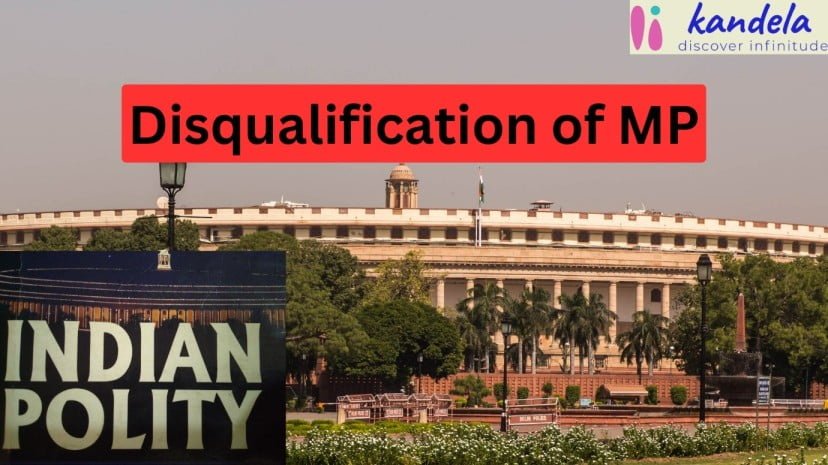MP Disqualification and Defamation Laws
why in News?
A political leader was recently sentenced to two years in jail by the Surat Court for a Defamation Case from 2019. The case was filed under sections 499 and 500 of the Indian Penal Code (IPC), which pertain to the offense of defamation. The MP had made remarks about another political leader that led to the charges.
About sections 499 and 500
Section 499 of the IPC provides a detailed explanation of how defamation can occur through spoken or written words, signs, or visible representations. Such actions can either be made public or conveyed privately with the intention to harm an individual’s reputation, or with knowledge or belief that the imputation could harm their reputation.
In accordance with Section 500, individuals found guilty of criminal defamation may face imprisonment for up to two years, with or without a fine.
What Is Defamation?
Defamation refers to the action of making false statements about an individual that harm their reputation as judged by a reasonable person.
Defamation occurs when a false statement is intentionally, knowingly, and maliciously published or spoken without privilege to damage a person’s reputation.
The origins of defamation can be traced back to Roman and German law, where abusive chants were punishable by death in Rome.
Defamation Law in India:
Article 19 of the Indian Constitution grants its citizens the fundamental right to freedom of speech. However, this freedom is not absolute, as Article 19(2) imposes certain reasonable restrictions, such as Contempt of Court, defamation, and incitement to an offense.
Defamation can be both a civil wrong and a criminal offense in India, depending on the objective they seek to achieve. A civil wrong seeks monetary compensation to redress the wrong, while criminal law seeks to punish the wrongdoer and send a message to others not to commit such acts, with a jail term. In a criminal offense, defamation must be established beyond reasonable doubt. In contrast, in a civil defamation suit, damages can be awarded based on probabilities.
Some argue that defamation laws are a violation of the fundamental rights guaranteed under Article 19 of the Constitution. However, the Supreme Court of India has ruled that the criminal provisions of defamation are constitutionally valid and not in conflict with the right to free speech. The court has also held that it is valid to treat defamation as a public wrong, and criminal defamation is not a disproportionate restriction on free speech, as protection of reputation is a fundamental right as well as a human right.
The court relied on the judgments of other countries and reaffirmed the right to reputation as a part of the right to life under Article 21. Using the principle of balancing of fundamental rights, the court held that the right to freedom of speech and expression cannot be given so much room that even the reputation of an individual, which is a constituent of Article 21, would have no entry into that area. In other words, the right to free speech must be balanced with the right to reputation, which is also a fundamental right.
Previous Defamation Judgements
In the case of Mahendra Ram Vs. Harnandan Prasad (1958), the plaintiff received a letter in Urdu which he could not understand, and thus required someone to read it to him. The defendant was aware of this fact but still sent the letter, which was deemed to be defamatory.
In Ram Jethmalani Vs. Subramanian Swamy (2006), the High Court of Delhi held Dr. Swamy responsible for defaming Ram Jetmalani. Dr. Swamy had claimed that Ram Jetmalani had received money from a banned organization to protect the then Chief Minister of Tamil Nadu in the case of assassination of Rajiv Gandhi.
The case of Shreya Singhal Vs. Union of India (2015) was a landmark decision in regards to internet defamation. The court ruled that Section 66A of the Information Technology Act, 2000, which punished individuals for sending offensive messages through communication services, was unconstitutional.
What Happens if a Lawmaker/MP is Convicted?
An MP can be disqualified due to conviction under Section 8(1) of the Representation of the People (RPA) Act of 1951.
Section 8(1) of the RPA includes offenses such as promoting enmity between different groups, bribery, undue influence, and personation at an election, among others.
An MP can be disqualified if convicted and sentenced to at least 2 years of imprisonment under Section 8(3) of the RPA.
The disqualification takes effect only after three months have elapsed from the date of conviction, as stated in Section 8(3) of the RPA.
Within the three-month period, the convicted MP can file an appeal against the sentence before the High Court.
Understanding
Intentional acts of defamation, which involve making false and damaging statements about a person with malicious intent, are punishable by imprisonment. This means that if someone deliberately defames another person with the intention of causing harm, they may face legal consequences. The defamation law is also considered to be constitutional and a reasonable restriction on the right to free speech and expression.
However, there are certain exceptions provided under the law where certain actions may not be considered as defamation. These exceptions have been outlined and defined over the course of the seventy-one years since India gained independence. There have been numerous cases of defamation over this time period, and each case has been interpreted by the courts with great care, resulting in the creation of legal precedents that guide future rulings.
Overall, while the law allows for the punishment of those who intentionally defame others, it also takes into account the nuances and complexities of each individual case. The exceptions provided also ensure that the right to free speech and expression is not unreasonably restricted. Through the careful interpretation of past cases, the legal system strives to maintain a balance between protecting individuals from defamation and upholding the principles of free speech and expression.

